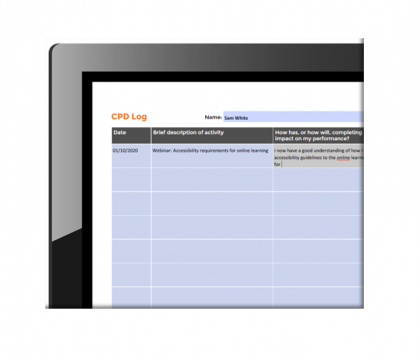They say that to go from a novice to mastery of a skill takes 10,000 hours. Whether this proves to be the case for everyone is debatable, and not everyone sets out to fully master a skill; being a capable practitioner would suffice for many. I made the conscious choice a few months back that I would learn an entirely new skill, (knowing that it had been a long while since I had last done so) and decided to teach myself the piano. Daily practice over the past few months has brought huge progress (at least I like to think so) but it is not without its frustrations. Finding the time and motivation to put in the practice hours can often be difficult. So why, you may ask, is this relevant to the world of business? Whether it be learning a skill associated with personal challenge or your professional development, each required dedication to achieve. This dedication brings with it some considerations for both the employee and the employer, which can impact hugely on whether the new skill becomes an asset to both parties or ends up being lost time and an overall negative experience. So how should the employee and the employer approach the development of a new skill?
Employee
Learning a new skill can be extremely beneficial to your career and demonstrates your dedication to your professional development; something that will be looked upon favourably by your employer. Choosing the right skill to learn is the first and most important step, as it needs to maintain your interest for you to continue with it but be of benefit to your employer for them to support it. Consider your current position and where you would like for your career to take you in 3-5 years-time. Comparing the skills you will need for your future career against the skills you currently have will give you a direction of travel that will support your development and maintain your interest for a good period of time.
Consider the 10,000 hours to mastery rule, (for comparison, a 3-year, full time apprenticeship will be circa 5500 hours). To what skill level are you looking to develop? Let us take project management as a case study. Many training courses for this area are delivered over the space of a week, designed to give you a baseline understanding of project management concepts and approaches. The actual skills development is dependent on you practicing these concepts over time, to the point that you become a proficient, confident practitioner. As such this will require the support of your employer to give you involvement in project management activities to start developing these skills and later moving into a project management role to perfect them.
As with learning any new skill, there will be frustrations along the way. This could be the lack of opportunity to practice, not knowing how to progress or struggling to get your head around new concepts. These will always come, but the impact can be lessened if you have techniques to deal with it. Build a support structure around you; your line manager, co-workers, HR and practicing professionals can all support you in your journey of skills development. Discuss this support structure with your line manager to formalise when and how you access this support.
Putting structure around developing your new skill is also key, as this will help to include it into your standard routine and make it habitual. This may take the form of dedicated time each week to study or perhaps work placement or activities that support your skill development. The key to this is planning, so make sure to agree your approach with your line manager so that it becomes achievable. In addition, make sure to set yourself realistic goals for developing your new skill. Saying that you are going to go from a novice to a brain surgeon in 6 months is completely unachievable, but setting yourself the target of learning the basic concepts of project management and getting an entry level role in the field within 12 months may well be.
Employer
As an employer, having a workforce that is keen to develop their skillset is a real asset. Focused skills development that is related to the outputs of your business (whether that be current or for a future change of direction) can help you to keep your workforce engaged, increase retention rates and can save you a lot of expenditure from recruiting the skills into your business.
Recognising that developing new skills takes time and dedication is important. Although there may be some flexibility in approach, there will be a need for the business to support the employee with their skills development. As with the employee, it is important that you plan as a business how you are going to provide support and how the skills development is going to change their career aspirations. Do you have a position for a higher skilled worker within the next 12 months? Will their new skill put them in line for a salary increase? Can you afford to allow them the required time or access to resources to develop their chosen skill?
Perhaps one of the worst things you can do is initially support their development, then leave them with nowhere to go with it. This will open the potential for them taking their new found skill elsewhere, which you have put time and effort into supporting. Make sure you have considered all these different areas so that you are less susceptible to surprises down the line.
That may seem like a lot of effort on the employers’ part, but there are many potential opportunities that can arise from a higher skilled workforce. These skills will help set you apart from your competition and may allow you to explore other areas of the market. Taking the previous example, lets imagine that you are the owner of a widget making business. Imagine that instead of just making the widgets, you are now able to fully project manage the design, production and fitment process due to having an employee with project management skills. Your offering increases, as will your market share.
Providing structured support to your employees when developing new skills is beneficial for both parties, ensuring that the employee meets their personal goals and the business benefits from this additional capability.
Learning a new skill can be challenging, daunting and exciting at the same time. It helps to keep employees engaged and rewards their confidence when they are able to keep active in their own personal development. A business that support their employee’s enthusiasm to learn new skills are often seen as great places to work and grow in line with their employee’s skills to offer better and different offerings to market. So whether it be practical, professional or management skills (but probably not my piano playing) make sure to plan, support and reap the benefits of learning a new skill.

Document your development
Maintaining a Continuing Professional Development (CPD) log gives your ownership of your learning and proves your development to others. To help you with this, we offer a free CPD log template.
Download CPD log template